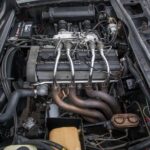Maintaining your Honda Elantra is crucial for ensuring its longevity, performance, and reliability. Following a regular maintenance schedule not only keeps your car running smoothly but also helps prevent costly repairs down the line. Understanding the basics of Honda Elantra maintenance will empower you to take proactive steps in caring for your vehicle.
Understanding the Honda Elantra Maintenance Schedule
Honda provides a recommended maintenance schedule for the Elantra in the owner’s manual. This schedule outlines when specific services should be performed based on mileage or time intervals, whichever comes first. These intervals are designed for “normal” driving conditions. If you frequently drive in severe conditions, such as stop-and-go traffic, extreme temperatures, or dusty roads, you may need to perform maintenance more frequently.
Key Maintenance Services for Your Honda Elantra
Regular maintenance for your Honda Elantra typically includes several key services:
- Oil and Oil Filter Changes: Engine oil is the lifeblood of your engine, lubricating its moving parts and preventing wear and tear. Regular oil changes, along with replacing the oil filter, are essential. Honda recommends specific oil types and change intervals, usually every 7,500 miles or 12 months under normal conditions, but always consult your owner’s manual.
- Tire Rotations: Rotating your tires at recommended intervals (often every 5,000 to 7,500 miles) helps ensure even wear and extends their lifespan. This is a simple but important maintenance task that can save you money in the long run.
- Multi-Point Inspections: Regular multi-point inspections are crucial for identifying potential issues before they become major problems. These inspections typically cover various components, including brakes, fluids, belts, hoses, and overall vehicle condition.
- Fluid Checks and Replacements: Besides engine oil, your Honda Elantra relies on other vital fluids, such as coolant, brake fluid, power steering fluid, and transmission fluid. These fluids need to be checked and replaced at recommended intervals to ensure proper system function and prevent component damage.
- Brake Inspections and Service: Your brakes are a critical safety system. Regular brake inspections are essential to check pad wear, rotor condition, and brake fluid levels. Brake pads and rotors will eventually need replacement due to wear and tear.
- Air Filter and Cabin Air Filter Replacement: The engine air filter prevents dirt and debris from entering the engine, while the cabin air filter cleans the air entering the passenger compartment. Replacing these filters at recommended intervals ensures optimal engine performance and air quality inside the vehicle.
- Spark Plug Replacement: Spark plugs are responsible for igniting the air-fuel mixture in the engine cylinders. They have a limited lifespan and need to be replaced to maintain engine efficiency and performance.
- Timing Belt/Chain Inspection/Replacement: Depending on your Elantra’s engine, it may have a timing belt or chain. Timing belts have a service life and must be replaced to prevent engine damage. Timing chains typically last longer but should still be inspected for wear.
Choosing a Service Provider for Your Honda Elantra
You have several options when it comes to servicing your Honda Elantra:
- Authorized Honda Dealers: Honda dealerships have certified technicians specifically trained to work on Honda vehicles. They use genuine Honda parts and have access to the latest diagnostic equipment. Dealership service can often be more expensive, but it provides expertise and assurance.
- Independent Repair Shops: Many reputable independent repair shops specialize in Asian import vehicles like Honda. These shops can often offer competitive pricing and quality service. It’s important to choose a shop with experienced technicians and positive reviews.
- DIY Maintenance (for basic tasks): For simple maintenance tasks like oil changes or air filter replacements, some owners may choose to do it themselves. However, for more complex repairs or maintenance, it’s generally recommended to seek professional service.
The Importance of Regular Honda Elantra Maintenance
Adhering to the recommended maintenance schedule for your Honda Elantra offers numerous benefits:
- Improved Reliability: Regular maintenance helps prevent breakdowns and keeps your Elantra running reliably for years to come.
- Enhanced Performance: Proper maintenance ensures your engine, brakes, and other systems are functioning optimally, maximizing performance and fuel efficiency.
- Extended Vehicle Lifespan: By addressing wear and tear proactively, you can significantly extend the lifespan of your Honda Elantra.
- Increased Safety: Regular brake inspections, tire maintenance, and fluid checks contribute to a safer driving experience.
- Higher Resale Value: A well-maintained vehicle with a documented service history typically commands a higher resale value.
Maintaining your Honda Elantra is an investment in its future. By understanding the maintenance schedule and choosing a qualified service provider, you can enjoy a smooth, reliable, and long-lasting driving experience. Consult your Honda Elantra owner’s manual for the specific maintenance intervals and recommendations for your model year.
